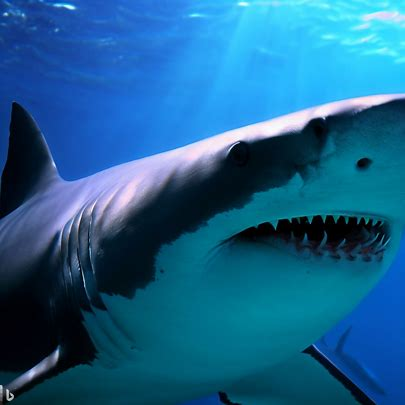
Great White Sharks: The aquatic equivalent of a cold-blooded mafia boss with a taste for frosty waters and a mean set of pearly whites.
But can they survive in such cold conditions? Let’s investigate their capabilities!
Unlike most fish, Great Whites possess a complex system called regional endothermy. This allows them to maintain a higher-than-ambient body temperature in specific regions of their bodies. An intricate network of blood vessels and heat-exchanging organs known as rete mirabile help them to do this.
These apex predators have also been found in various oceanic regions across the globe. From warmer waters like California and South Africa, to colder areas like Alaska and New Zealand – Great Whites adapt and thrive in diverse aquatic ecosystems.
Moreover, research has shown that some Great Whites even migrate between warm and cold-water habitats. For example, they’ve been tracked traveling from California to Mexico’s Guadalupe Island for food and mating opportunities.
Finally, a study conducted by Stanford University revealed that Great Whites can retain elevated body temperatures of up to 25 degrees Celsius above the surrounding water temperature. This showcases their remarkable thermoregulation abilities.
What is a Great White Shark?
The mighty and majestic Great White Shark prowls the depths of the ocean. Its streamlined body is perfect for hunting. It is known for its large size, sharp teeth, and dark grey dorsal fin.
This apex predator has an incredible sense of smell. It can detect blood from miles away. Its serrated teeth are designed to tear through flesh. It has strong jaw muscles that give it a powerful bite force.
Unlike most sharks, the Great White Shark has warm-blooded characteristics. It can raise its body temperature above the surrounding water. This enables it to survive in both warm and cold environments.
Studies show that Great White Sharks prefer warmer waters for breeding and feeding. They seek out abundant prey sources. This is possibly due to their need for larger meals and higher metabolic rate.
Characteristics of Great White Sharks

Great White Sharks have special qualities that make them stand out from other sea creatures. They can get up to 20ft long and weigh over 2,000 pounds! With their sleek body and strong tail, they can swim very quickly. Their senses are amazing, especially the power to detect even tiny electrical signals from their potential prey. That makes them great hunters in the ocean.
- Size: Growing to 20 feet and weighing more than 2,000 pounds, Great Whites are one of the biggest predatory fish.
- Features: Grayish-brown on top and white on the bottom helps them hide when hunting.
- Teeth: Sharp, serrated teeth to tear up their prey.
- Hunting Talents: They use their vision and smell to spot prey from far away.
Despite their fearsome look, Great Whites are important in keeping the balance in the marine world. As top predators, they eat weaker or older creatures. This makes sure only the strongest ones survive.
Researchers found a massive Great White off the coast of South Africa. It jumped out of the water while hunting seals near an island. This stunning sight showed how incredible these creatures can be in their home.
By finding out about Great White Sharks, we can admire them better. They are the kings of the ocean who command respect with poise and grace. Great Whites are like remote workers – they’ll go to any depths for their dream job!
Habitat of Great White Sharks
Great white sharks have impressive size and a fearsome reputation. They can survive in many habitats – both warm and cold waters.
One thing they need is open water – to roam and hunt. From South Africa to the Pacific Ocean, these sharks are found in vast areas.
Surprisingly, they can even manage colder waters – some were seen in temperatures as low as 12°C (54°F)! This adaptability helps them to thrive.
They keep their body temperature stable through regional endothermy. This means they can maintain heat in important parts of their body, like muscles and organs.
A great example of this is off Cape Cod in Massachusetts. Every summer, seals gather here. The cold ocean currents don’t stop hungry great white sharks from making the journey for an easy meal.
Can Great White Sharks Live in Cold Water?
Can great white sharks survive in cold water? Yup! These creatures have adapted to ocean temperatures, including chilly waters.
They’re known for their ability to thrive in different environments. Even in cold coasts of South Africa and California, they can be found.
Insulating fat called blubber helps them regulate body temperature, so they swim comfortably in cool waters.
Experts were surprised when a great white shark was found swimming off the coast of freezing Nova Scotia. This proves their adaptability!
Adaptations of Great White Sharks in Cold Water

The Great White Shark has many remarkable adaptations for surviving in cold water. They have an insulating layer of fat, a counter-current heat exchange system, efficient blood circulation, and a large oil-rich liver for energy storage. These apex predators also have sophisticated sensory adaptations, like electroreceptors, which help them detect prey. Some even migrate to warmer waters in the winter.
Plus, their tooth structure is specially adapted to be able to withstand the pressure of hunting large marine mammals. In fact, a study showed that despite the freezing temperatures, these sharks are highly efficient at keeping their core body temperature constant.
It’s almost like playing freeze tag – Great White Sharks may be the predators, but even they can’t escape the chills of icy waters!
Challenges and Risks in Cold Water Environments
Cold water presents various difficulties and dangers for living organisms. Let’s check out the ones the great white shark faces!
Let’s view these troubles in a table:
| Challenges | Risks |
|---|---|
| Slower metabolic rate | Hypothermia |
| Limited food supply | Lower energy intake |
| Difficulty to keep warm | Slower motion and response time |
Aside from the above, great white sharks have to deal with lower oxygen and reduced breeding success in cold waters. These facts reveal the big problems these creatures face.
Pro Tip: Despite all this, great white sharks have ways to survive and even thrive in cold waters. They can regulate their body temperature by doing things like sunbathing at the surface.
Conclusion: Even great white sharks need some warmth – in the form of cold water snacks!
Frequently Asked Questions
FAQs about whether Great White Sharks can live in cold water:
1. Can Great White Sharks survive in cold water?
Yes, Great White Sharks can survive in cold water. They are highly adaptable and can be found in a wide range of temperatures, including colder waters.
2. How do Great White Sharks tolerate cold temperatures?
Great White Sharks are ectothermic animals, which means they rely on external sources of heat to regulate their body temperature. They have adaptations such as a large liver and blood vessels that help retain heat in colder waters.
3. What are the coldest waters where Great White Sharks can be found?
Great White Sharks have been observed in waters as cold as 46°F (8°C). They have been known to inhabit areas such as the coasts of South Africa and California, where the water can be quite chilly.
4. Are there any specific cold water habitats preferred by Great White Sharks?
While Great White Sharks can tolerate cold water, they tend to prefer areas with moderate temperatures. They are commonly found in cool coastal waters where there is abundant prey and suitable conditions for hunting.
5. Do Great White Sharks migrate to warmer waters during winter?
Some Great White Sharks do exhibit migratory behavior, but not all of them move to warmer waters during winter. Those that live in colder regions may migrate to seek out prey or breeding opportunities, while others stay in their preferred habitats regardless of the temperature.
6. Can Great White Sharks survive in freezing waters?
While Great White Sharks are capable of tolerating colder waters, they cannot survive in freezing temperatures for extended periods. Their ability to regulate their body temperature relies on finding suitable conditions, and prolonged exposure to freezing waters can be lethal to them.
Conclusion
Great White Sharks are famous for their ability to live in many environments, even cold waters. These predators have been seen in areas such as California and South Africa, which have low temperatures. Despite this, they have adapted to these habitats.
They have unique features like their large size, which helps them to keep their body heat. Also, their streamlined bodies and strong muscles help them to move easily through the cold water.
Furthermore, their diet helps them to survive the cold. These hunters eat many marine animals that live in colder regions, supplying them with food and energy.
Research also shows that Great Whites can travel long distances to find food and breeding grounds. This allows them to move to warmer waters when the temperature is too cold for them.
A remarkable example of their resilience happened in 2003: Scientists found a shark called Nicole who had gone over 12,000 miles from South Africa to Australia. This shows that these predators can withstand tough conditions in order to survive.
References
White shark | Size, Diet, Habitat, Teeth, Attacks, & Facts | Britannica




